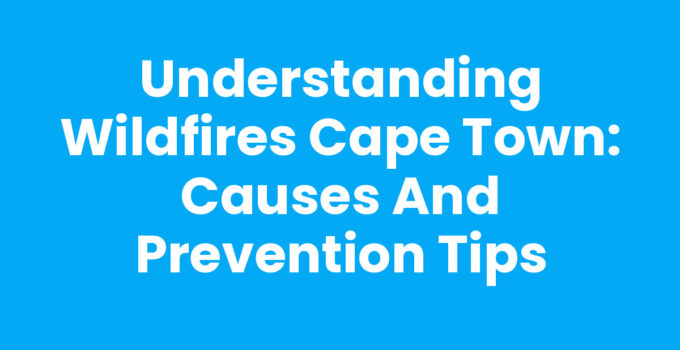Wildfires have become an alarming concern in many parts of the world, and Cape Town is no exception. Known for its stunning landscapes and rich biodiversity, the region faces unique challenges when it comes to wildfires, especially during the hot summer months. In this comprehensive guide, we will explore the factors contributing to wildfires in Cape Town, their environmental impact, and effective preventative measures that communities can adopt.
Wildfires Cape Town: What Causes Them and How to Prevent Them
Wildfires in Cape Town often arise from a combination of natural and human-induced factors. Understanding these elements is crucial to reducing the risk of fire outbreaks.
1. Climate and Weather Conditions
The Cape Town area experiences a Mediterranean climate that includes hot, dry summers and mild, wet winters. During summer, humidity levels drop significantly, and strong winds can exacerbate fire conditions. When combined with high temperatures and low rainfall, this creates an ideal environment for wildfires to spark and spread quickly.
2. Vegetation and Topography
The diverse vegetation found in Cape Town, ranging from fynbos to forests, can be highly flammable during dry seasons. Areas with dense vegetation can serve as fuel for wildfires, while the region’s varied topography can influence how fires spread. Understanding these factors can help in developing effective fire management strategies.
3. Human Activity
Human activities, such as land clearing, outdoor burning, discarded cigarette butts, and arson, also contribute significantly to wildfire risks. Education and awareness programs are essential to mitigate these risks and promote responsible behavior among residents and visitors.
Steps to Prevent Wildfires in Cape Town:
- Maintain Vegetation: Regularly clear dry grass, leaves, and other flammable materials around your properties to reduce fire risks.
- Firebreaks: Establish and maintain firebreaks in high-risk areas, which can help contain wildfires and protect communities.
- Public Awareness Campaigns: Engage local communities in awareness programs focused on fire safety practices.
- Emergency Preparedness: Have a clear emergency plan in place, ensuring all family members know evacuation routes and safety measures.
- Reporting Suspicious Activity: Encourage vigilance in reporting any suspicious activity that could lead to wildfires.
Check This: Discover The Bay Hotel Cape Town: A Luxurious Escape
The Environmental Impact of Wildfires in Cape Town
The implications of wildfires extend far beyond immediate destruction. Here’s how they impact the environment:
1. Ecosystem Disruption
Wildfires can disrupt habitats, leading to loss of biodiversity. Many species depend on specific ecosystems that can be devastated by fire. It may take years for these ecosystems to recover, affecting flora and fauna along the way.
2. Air Quality Deterioration
During a wildfire, smoke contributes to poor air quality, which can have significant health implications for local populations. Vulnerable groups, such as children and the elderly, may experience exacerbated respiratory issues due to smoke inhalation.
3. Soil Erosion and Water Quality
A fire can lead to soil erosion by removing the vegetation that holds soil in place. Erosion can affect streams and water quality, impacting aquatic ecosystems and potentially leading to harmful algal blooms.
Check This: Exploring Camp Bay Cape Town: A Stunning Coastal Escape
Conclusion
Understanding wildfires in Cape Town is essential for protecting the environment and ensuring the safety of communities. By knowing the causes and taking preventative measures, residents can significantly reduce the risks associated with wildfires. It is incumbent upon all of us to stay vigilant, engage in responsible practices, and prioritize the health of our natural surroundings. Together, we can work to sustain the breathtaking beauty of Cape Town while safeguarding against the threats posed by wildfires.
Recommended Guide: Exploring Cape Town Harbour: A Guide to Its Wonders
Frequently Asked Questions
What are the main causes of wildfires in Cape Town?
The main causes include dry and windy conditions, dense vegetation, and human activities such as outdoor burning and arson.
How can we prevent wildfires in our community?
Preventive measures include maintaining vegetation, creating firebreaks, raising public awareness, and formulation of emergency plans.
What is the environmental impact of wildfires?
Wildfires disrupt ecosystems, degrade air quality, and lead to soil erosion, affecting both terrestrial and aquatic environments.



